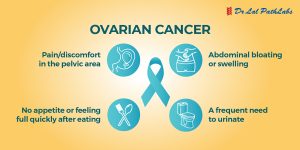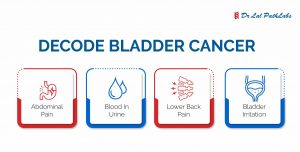What Are the Early Signs of Stomach Cancer?
- 24 Jan, 2025
- Written by Team Dr Lal PathLabs
Medically Approved by Dr. Seema
Table of Contents

As per the World Cancer Research Fund International, India reported 64,611 cases of stomach cancer in 2022. Gastric cancer, also known as stomach cancer, is a severe condition that originates in the cells lining the stomach. It poses a major health challenge because it often shows no clear symptoms in its early stages, making it tough to detect and treat effectively. This blog explores stomach cancer symptoms, its causes, and how it is diagnosed.
What is Stomach Cancer?
Stomach cancer occurs when abnormal cells grow uncontrollably in the stomach’s inner lining, forming a tumour. Over time, this tumour can penetrate deeper layers of the stomach wall and may spread to other parts of the body. Most stomach cancers are adenocarcinomas, which originate from the glandular cells in the stomach lining responsible for producing mucus and other digestive fluids.
What are the Causes of Stomach Cancer?
According to the National Cancer Institute, the following are the causes of stomach cancer.
● Infection with Helicobacter pylori bacteria
● Diet high in smoked, pickled, and salted foods
● Smoking
● Obesity
● Family history of stomach cancer
● Chronic gastritis
● Pernicious anaemia
● Certain genetic conditions
● Excessive alcohol consumption
What are the Signs of Stomach Cancer?
Stomach cancer’s early symptoms are often subtle and easy to confuse with common digestive issues. Here are some of its common symptoms.
1. Persistent Indigestion and Heartburn
Frequent indigestion or heartburn that does not resolve with standard remedies may be stomach cancer’s early symptom. Although occasional discomfort after meals is common, persistent symptoms that don’t improve with over-the-counter medications should be evaluated by a doctor.
2. Feeling Bloated After Meals
Another symptom that can appear in the early stages is a sensation of fullness or bloating even after eating small portions of food. This can result from a tumour in the stomach pressing on the stomach or causing delayed emptying of its contents.
3. Loss of Appetite and Early Satiety
Another common stomach cancer symptom is a reduced desire to eat or feeling full quickly, even after a small meal. This symptom often occurs with bloating and can lead to unintended weight loss over time.
4. Nausea and Occasional Vomiting
Mild nausea without a clear cause can be an early indicator of stomach cancer. Vomiting may occur occasionally, sometimes accompanied by traces of blood, which could indicate bleeding within the stomach. While these symptoms can also be linked to less severe gastrointestinal issues, they should not be ignored if persistent.
5. Abdominal Pain or Discomfort
In the initial stages of stomach cancer, individuals may feel vague pain or discomfort in the upper abdomen, typically just above the navel. This sensation might range from mild discomfort to sharper pain that doesn’t subside with typical pain relief measures.
6. Unexplained Weight Loss
Sudden, unexplained weight loss is another stomach cancer early symptom. If weight loss occurs without any changes to diet or activity levels, especially when combined with other symptoms, it should raise concern and prompt medical attention.
7. Fatigue and Weakness
Fatigue and weakness are common stomach cancer early symptoms. As the cancer progresses, chronic bleeding in the stomach can lead to anaemia, which reduces red blood cell count and results in persistent tiredness.
8. Difficulty Swallowing
If the cancer is located near the oesophagus, it can cause swallowing difficulties. Although this stomach cancer symptom is more common in advanced stages, some individuals may experience it earlier.
9. Dark or Bloody Stool
Bleeding within the stomach can lead to stools that appear dark or tarry. This symptom is typically a sign of more advanced disease but can sometimes occur in earlier stages as well.
How is Stomach Cancer Diagnosed?
Diagnosing stomach cancer generally involves multiple steps:
- Physical Examination and Medical History: The process begins with a detailed review of risk factors, symptoms, and family history, followed by a physical exam to assess the patient’s condition.
- Endoscopy: In this, a flexible tube with a camera is inserted through the mouth to inspect the stomach lining for any abnormalities.
- Biopsy: Tissue samples are taken during the endoscopy and examined under a microscope to verify the presence of cancer cells.
- Imaging Tests: Methods such as PET scans, CT scans, and X-rays help assess how far the cancer has spread.
- Laboratory Tests: Blood tests are performed to check overall health and detect specific cancer markers.
Regular medical check-ups and attention to bodily changes are vital. Early consultation with healthcare professionals upon noticing persistent symptoms can lead to timely diagnosis and stomach cancer treatment. To book a test, visit Dr Lal PathLabs website.
FAQs
1. What are the symptoms of stomach cancer in a woman?
The symptoms of stomach cancer in women may include persistent indigestion, trapped wind, frequent burping, feeling full quickly when eating, heartburn, and difficulty swallowing.
2. Is there any cure for stomach cancer?
As per the National Cancer Institute, surgery is a common treatment for stomach cancer.
3. What are the types of stomach cancer?
There are four types of stomach cancer, including adenocarcinoma, lymphoma, gastrointestinal stromal tumours (GISTs) and carcinoid tumours.














